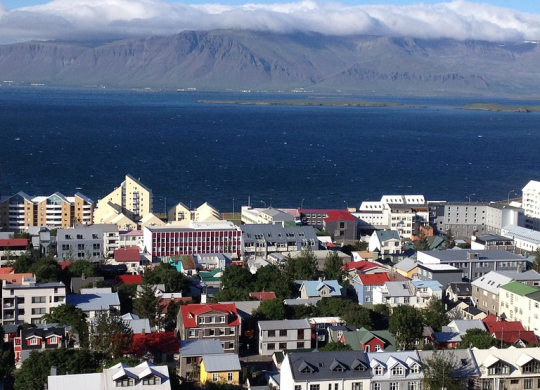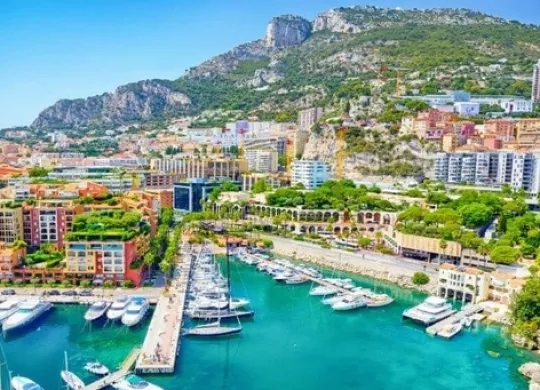Job in Iceland for foreigners in 2024: labor market, work visa and basic requirements
Table of contents
- Iceland's labor market
- What positions do foreigners work in Iceland?
- Requirements for foreign workers for employment in Iceland
- Types of work visas in Iceland
- Seasonal work in Iceland
- Where to look for a job in Iceland?
- Do you need to know Icelandic to get a job in Iceland?
- Pros of employment in Iceland
- Taxes in Iceland

Iceland is known for its breathtaking landscapes, but few people know that it also has a market economy that is actively developing. With competitive wages and job opportunities, the country offers good career prospects. Find out what it takes to get a job in Iceland in 2024
Working abroad is a great opportunity to gain valuable professional experience, as well as to get to know another country, culture and new people.
Iceland is one of the most popular destinations for labor emigration, because it has a developed economy, a high standard of living and good salaries. Expats who plan to work in Iceland will find many prospects and opportunities here.
How to move to Iceland? Read more about the job in Iceland for expats in 2024 in this article.
Iceland's labor market
Labor market offers many jobs for foreigners in Iceland, because the country has a stable economy and a democratic government. Iceland's main industries are aluminum smelting, fishing and tourism.
The growth of the IT sector and the sustainability of renewable energy industries also contribute to increasing employment opportunities.
These factors indicate a strong labor market in the country, which is why the state attracts workers from abroad, including citizens of Pakistan, Nigeria, Nepal and India. Today, foreigners make up about 12-13% of the workforce, contributing to various sectors and strengthening Iceland's economy.
According to the latest data, the unemployment rate in Iceland is 3.4%, making it an attractive place for job seekers.
What positions do foreigners work in Iceland?
The list of the most sought-after positions in Iceland includes:
- Professionals in the tourism industry: Iceland ranks 37th in the world in terms of the number of tourists. This is why the tourism sector offers many employment opportunities for locals and foreigners.
- IT and technology professionals: Software developers, IT consultants, data analysts and cyber security experts are common positions.
- Healthcare workers: As in most countries, healthcare is a critical sector. That is why there is a demand for doctors, nurses, therapists and other medical professionals in Iceland.
-Fisheries and aluminum smelters – these sectors form the historical backbone of Iceland's economy, requiring a constant flow of workers from ship crew to aluminum smelter technicians.
- Education professionals: the demand for English-speaking teachers and lecturers in international schools and language centers is increasing.
- Professionals in the energy sector: Given Iceland's dependence on renewable energy sources, there are opportunities for engineers and technicians specializing in geothermal and hydroelectric power.
- Builders: Due to the constant development of infrastructure and the booming real estate sector, builders, architects and civil engineers are in demand.
Requirements for foreign workers for employment in Iceland
The rules for obtaining a work permit in Iceland depend on the expat's citizenship, in particular:
- Citizens of non-EU/EEA countries need a work permit and a residence permit to work in Iceland. Most often, the employer initiates the process of obtaining a permit by a foreigner.
- For EU/EEA citizens, the process is easier due to freedom of movement rights. They can live and work in Iceland without a permit. However, they must register with the Icelandic Directorate of Immigration if they plan to stay longer than three months.
Importantly! Regardless of origin, all foreign workers must have a kennitala (national identification number), which is required for almost all operations in Iceland, including opening a bank account and receiving a salary.
Types of work visas in Iceland
1. Work visa of a qualified employee
The most common visa for non-EU nationals who have obtained a job in Iceland.
The main requirements include having:
- A valid job offer from an Icelandic employer.
- Work, as a rule, should be in a field where there is a shortage of local specialists.
- The employer often needs to demonstrate that the position cannot be filled by a local or EU citizen.
2. Job seeker's visa
This visa is intended for persons who wish to enter Iceland in order to find work. It is important to note that this option may have more limitations and is less common. Requirements typically include:
- Confirmation of sufficient funds to support your stay in Iceland while looking for work.
- A clear job search plan or strategy.
- Appropriate qualifications and work experience in your field.
3. Business visa
For entrepreneurs or business professionals who intend to start a business or do business in Iceland. The requirements are as follows:
- Detailed business plan.
- Evidence of financial investment or support.
- Relevant business experience or qualifications.
The procedure for obtaining a residence permit in Iceland is at the link.
Seasonal work in Iceland
There are quite a lot of summer jobs in Iceland, so there will be no problems with seasonal employment. This type of employment will allow you to get to know the Icelandic culture and work in truly picturesque places. For seasonal work, you can choose one of the following vacancies:
- Tourism sector: tour guides, hotel and restaurant staff are in high demand. It's a great way to connect with travelers from all over the world.
- Fishing Industry: Temporary positions available in fishing and seafood processing, offering hands-on experience in an important industry in Iceland.
- Farming: Helping on a farm, especially on sheep and horse farms, can provide a full experience of rural Icelandic life.
- Event Staff: Music festivals, cultural events and sporting events often require temporary staff to ensure smooth operations.
In order to safely move, travel or work in a new country, you will need health insurance. You can issue an extended policy on our website using the link.
Where to look for a job in Iceland?
Most foreigners look for work in Iceland in one of the following ways:
- Job websites: Platforms such as Alfred, Storf.is, EURES, CareerBuilder offer ads for various jobs in Iceland.
- Staffing agencies: use staffing agencies such as Elja.is that have local expertise to help you find suitable vacancies.
- LinkedIn: Sign up for a LinkedIn account and use it to connect with local contacts and search for jobs.
- Government resources: Refer to government websites such as the Labor Office (Vinnumalastofnun) and Statistics Iceland (Hagstof Islands) for up-to-date information on the labor market.
Do you need to know Icelandic to get a job in Iceland?
It is also important to note that working in Iceland for English speakers is usually the easiest way to get a job in Iceland as an expat.
However, learning Icelandic can greatly improve social integration and employment opportunities.
Pros of employment in Iceland
The advantages of working in Iceland include the following:
1. An ideal balance between work and personal life.
If there's one thing Icelanders value, it's a healthy work-life balance. Icelanders are very family oriented, the average working week in Iceland is 40 hours, including a lunch break, and is very often flexible. Also, Iceland plans to be the first to officially switch to a four-day work week.
2. Equality in work.
Iceland has been a leader in gender equality since 2009. Although there is still room for growth, the gender pay gap for the same job is only 4.5%.
3. Easy business environment.
Iceland's business culture is not very hierarchical, and no matter where you work in the company, everyone is treated the same.
4. Strong social protection.
Iceland operates under the usual Scandinavian system of tripartite cooperation between employers, trade unions and the government. Therefore, employees can be sure of safety at the workplace, stable pay and a favorable working environment.
5. Innovation and creative approach are valued.
Despite its small size, Iceland impresses with the number of innovative solutions and the availability of creative products.
Taxes in Iceland
Expats working in Iceland must pay the same taxes as local residents. Taxes are automatically withheld from your paycheck. The municipal tax in Iceland is calculated at the following levels:
- 36.94% for income between 0 and 834,707 ISK (€5,540) per month.
- 46.24% for income exceeding ISK 834,708 (€5,540) per month.
Anyone over the age of 16 can apply for a tax card, which gives taxpayers personal tax relief.
Only 75% of your income as a foreign expert is taxed for the first three years of work in Iceland, provided that you apply within 3 months of the start date to the Icelandic Research Center.
Iceland is a promising country for the employment of expats, which attracts with an ideal balance between work and private life, a high level of social protection and competitive wages. Moving here will be a good stage in the life of foreigners.
We will remind you! We have already told you that in October 2024, the government of Iceland announced that the country could become the first state in the world where the four-day work week will be officially approved and become a standard.
Ihor Usyk - head of Visit World's legal department
To organize a safe move to Sweden, I advise you to contact a specialist. My colleagues, qualified specialists with legal education, will help you avoid unpleasant situations when traveling abroad.
Products from Visit World for a comfortable trip:
Checklist for obtaining a visa and necessary documents in the Iceland;
Legal advice on immigration to the Iceland;
Travel insurance for foreigners in the Iceland;
Medical insurance all over the world.
We monitor the accuracy and relevance of our information, so if you notice any errors or inconsistencies, please contact our hotline.
Recommended articles
2 min
Work
Job in Japan for expats in 2024: labor market, work visa and basic requirements
Japan is a promising country for expats to move to, which attracts high quality of life and career prospects. Considering that in recent years the state has increasingly opened its doors to foreigners, local employers are increasingly hiring specialists from abroad. Find out what are the features of the Japanese labor market and how a foreigner can get a work visa in the country
04 lis. 2024
More details2 min
Work
How to get a job in Monaco in 2024: labor market, work visa and basic requirements
Monaco is a small state in the southwestern part of Europe, a semi-enclave surrounded by France on all sides. Due to the high level of economic development, the state is a promising destination for international workers. Find out what positions foreigners work in Andorra in 2024, what the working conditions are and the procedure for obtaining a work visa
11 lis. 2024
More details1 min
Expats
Which African countries offer visas for remote workers?
African countries are actively fighting the crisis in tourism that arose after the COVID-19 pandemic. In particular, to attract more expats and stimulate the economy, the country is introducing a visa for digital nomads. Find out in which countries in Africa you can already issue a visa for remote workers and what are the requirements
13 lis. 2024
More details1 min
Work
Seasonal worker visa UK: the government plans to issue 45,000 permits in 2025
The UK government has approved the number of seasonal work visas for 2025 that it plans to issue for temporary agricultural work in the horticulture and poultry sectors. Find out what rights, requirements and the procedure for applying for a permit are relevant in 2025
14 lis. 2024
More detailsAll materials and articles are owned by VisitWorld.Today and are protected by international intellectual property regulations. When using materials, approval from VisitWorld.Today is required.
